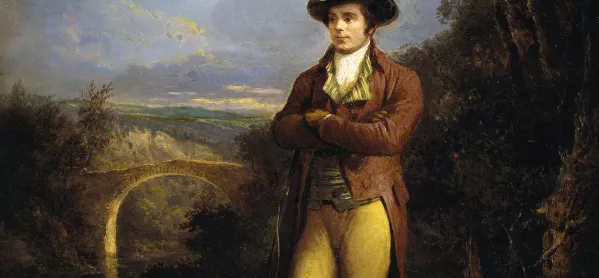‘Using Scots language in class is immensely valuable’

The stooshie is noo a stramash. Would that be a polite way to describe recent events? Aye, it wid be. Polite, and definitely an understatement. It’s been an awful year for so many, and it’s not over yet.
But hopefully, there’s good news coming soon. In times like these, I find it helps to value the little things that go well. The wee victories. Think about Scottish football: sometimes simply qualifying is enough to celebrate - you don’t need to win it all to boogie.
If there was ever a Scot who recognised and valued the wee-est of the wee, it was Robert Burns. Personally, my favourite Burns poem has always been To A Mouse. Burns wrote the poem after finding a peerie mootie moose’s nest when working in a field. Before he moved to Edinburgh and could sit alongside the intellectual elite of Europe, he lived on a small farm, in a much smaller town than Scotland’s capital, working with a plough rather than a pen.
Scots: 4 top tips for using Scots language in the classroom
Burns Day: Robert Burns’ poetry ‘should be an essential part’ of school
Related: The importance of using Scots language in the classroom
Scots language: A lesson for teachers from the Scots Wikipedia page
Opinion: ‘Scots language should be part of everyday teaching’
Long read: Why learning Scots is having a moment
Using Scots in the classroom, whether it’s Burns’ poetry or something else entirely, is immensely valuable. A fantastic example of this came during lockdown: I was contacted by Claire Kerr, a primary teacher in Dumfries, who instead of cancelling or rescheduling a collaboration she had planned with author Susi Briggs, managed to turn it into a project that every child in her class contributed to.
Burns Night: Exploring the Scots language in schools
The class - with the support and infectious enthusiasm of Briggs - created a virtual glossary of the author’s children’s book Nip Nebs. You can see the results for yourself here on Vimeo, and see evidence of the variety of literacy and language skills being developed - listening and talking, reading, learning new vocabulary, being able to “perform” and talk to a camera, to name but a few.
This was done entirely online, with support and consent from parents, and obvious joy from the bairns themselves. When it came time for me to nominate teachers for the 2020 Scots Language Awards, the first name on my list was Claire Kerr - and I was delighted that the public voted her the winner.
There are excellent wee BBC videos for remote learning. I use these in the live e-Sgoil lessons I do as part of the national e-learning offer. There are many other great resources available for teachers planning Scots lessons for bairns at hame, including Scots in Schools, Scots Learning Centre and Wee Windaes.
Obviously, Scots can be tricky for learners who don’t already have a knowledge of the language. That’s why audio recordings and dictionaries are immensely valuable. So it’s braw to be able to share news of a new app: the folks at the Dictionary of the Scots Language (DSL) have produced a new Scots dictionary for schools, which provides meanings in English for 9,500 Scots words and phrases.
The dictionary’s contents range from everyday terms like glaikit (stupid), mind (to remember) and bairn (child), to words now encountered mainly on Burns Night, for example sonsie (attractive), drouthy (thirsty), and painch (stomach). The dictionary also includes audio guides to the pronunciation of around 600 unfamiliar spellings.
Deputy first minister and education secretary John Swinney said as the app was launched that Scots “is often the language used at home” and that it is important to “encourage and nurture young people’s creativity and identity as a Scots speaker”.
I think that’s a wee victory worthy o a toast on the Bard’s birthday.
For any teachers needing support (or even just a blether), please feel free to email me and I’ll do my best to help: bruce.eunson@educationscotland.gov.scot
Bruce Eunson is Scots language coordinator for Education Scotland
You need a Tes subscription to read this article
Subscribe now to read this article and get other subscriber-only content:
- Unlimited access to all Tes magazine content
- Exclusive subscriber-only stories
- Award-winning email newsletters
Already a subscriber? Log in
You need a subscription to read this article
Subscribe now to read this article and get other subscriber-only content, including:
- Unlimited access to all Tes magazine content
- Exclusive subscriber-only stories
- Award-winning email newsletters